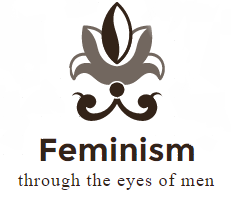Men in politics: their effect on feminism
In order to explain how politics cope with feminism, it is necessary to study feminism through a sociologist paradigm. Therefore, it is crucial to state that every society is torn into two complementary spheres: the private sphere (family, procreation, non-lucrative sphere) and the public sphere (work, lucrative sphere). Needless to say, men have always been responsible of the public sphere: a father has an economical duty that consists of working and making a living wage for his family and himself. Systematically women are in charge of the private sphere. A female's role is limited to managing home chores and providing affection for her family.
This lack of lucrativity of females' responsibilities naturally leads to the marginalization and disregard of their role within their societies. In fact, countless men, or misogynists to be more exact, highly believe that performing any kind of "feminine" work would degrade their masculinity. It is, therefore, crucial to insist on the fact that this dogma had strong support from state laws and policies. Countries that seem to have admirable jurisdictional systems today had bestowed the gender hierarchy in their laws for a long time. In fact, the French civil code published in 1804 gave married women the same status as minors, until as late as 1965.
Some key (political) factors shifted these gender roles. World War I for example mobilized women: they had to take up more work in the public sphere whilst men were belligerents. The after-war impact was unavoidable: men's unemployment increased to the extent that some European states voted laws that would limit women's rights to work.
But feminist movements and human rights activists' pleasant success was prominent in the second half of the 20th century. Many political and judiciary reforms took place in favor of gender equality.
The role of men in politics: good politics, bad politics?
Men in politics have the power to influence, to take charge, to take action. They have the authority that can be used for the good of the people, or for their own good. Whereas most people might think it's hard to find a link between male politicians and feminism, some truths say otherwise.
Men in politics can intervene to free women from their position of inferiority. If we zoom in on the history of the Middle East, there are two distinct interventions by politicians in terms of feminism. To elaborate further, we will take Egypt and Tunisia as examples.
Under the presidency of Jamal Abdel Nasser, the country of Egypt knew a socialist system. Such a system favored equality among the citizens, on all levels, but most importantly, Abdel Nasser specified on the significance of the education of women in order to enable them to take part in society. The outcome of such an intervention was positive: it left women with more freedom, and even after Abdel Nasser's presidency, no one questioned the newly-acquired female positions.
However, not every politician's intervention can be helpful: the case of Tunisia under the presidency of Habib Bourguiba. His approach towards feminism was much more violent, and its effects much more damaging than helpful. What Bourguiba did was that he imposed upon the Tunisian people a sudden change in affairs: Bourguiba was described as a dictator, and everything imposed by a dictator can never be well-received. Therefore Bourguiba's reforms harmed the feminist movement because after he was removed from power in 2011, feminism was a subject of debate: Were the newly-found women's roles legitimate? He inflicted the movement with his dictatorship, rendering it less credible and more fearful.

The effect men in politics can have on feminism reached a degree of importance that can't be overlooked in Lebanon. The pursuit of women to be able to be equally represented in parliament has been reprimanded. By whom? Male politicians. Although some, but not most, support the installation of a female quota, only it has not been imposed in the new Electoral Law. Therefore, the patriarchy system that has been installed in the Lebanese parliament and government has been posing a threat to the feminist movement, thus the weight of men in politics on women claiming equal rights.
